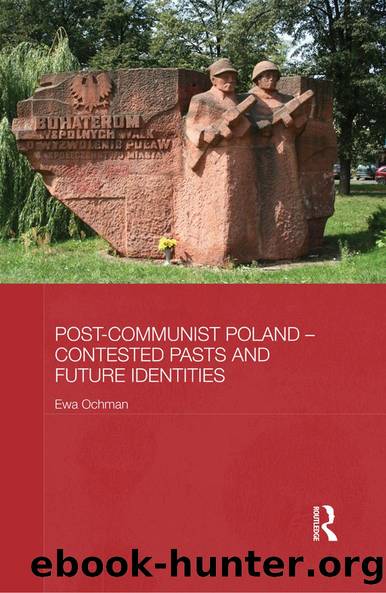Post-Communist Poland - Contested Pasts and Future Identities by Ewa Ochman

Author:Ewa Ochman [Ochman, Ewa]
Language: eng
Format: epub
Tags: Social Science, Ethnic Studies, General, Regional Studies
ISBN: 9781135916008
Google: LURno26LmGwC
Publisher: Routledge
Published: 2013-07-18T04:48:09+00:00
Part 3
7 Municipalities and the search for the local past
The post-1989 municipal commemorative practices initially focused on the representation of the national historical narratives of the newly liberated nation-states. This re-composing of the past was achieved by the renaming of public space, by the removal of old and installation of new monuments and by revising the list of collectively commemorated anniversaries. However, the focus of commemorative practices has increasingly been shifting and the specificity of the urban landscape, the distinctive population make-up and the mass memory of the inhabitants of the municipality has become central to citiesâ remembering. This change in the dominant strategy of municipal remembrance has been propelled by a number of developments. Apart from the administrative and territorial reforms of 1990 and 1999 that created stronger self-governing municipalities, which needed to respond to a historical heritage that impacts upon their socio-economic future, there are developments which are directly stimulating the process of municipal remembrance focused on local history. As local authorities seek political legitimisation and try to increase community cohesion, they have to take into consideration the present needs of their electorate when advancing particular images of the past. Cooperation with agencies of civil society is crucial in this process.
This chapter focuses on a provincial city, Gliwice, located in Upper Silesia, the historical western borderland of Poland, rather than a capital city â as capital cities are usually representative of the historical heritage of the nation-state as a whole. It traces how the reclaiming of commemorative space for local â multilayered and multi-ethnic â war memories has altered the urban landscape in Gliwice in the last decade and what kinds of functions have been assigned by the municipal authorities to the newly created/relegated/destroyed memory space during the democratic and economic transformations experienced by the city and the region.
Download
This site does not store any files on its server. We only index and link to content provided by other sites. Please contact the content providers to delete copyright contents if any and email us, we'll remove relevant links or contents immediately.
| Anthropology | Archaeology |
| Philosophy | Politics & Government |
| Social Sciences | Sociology |
| Women's Studies |
The Leavers by Lisa Ko(6506)
Born to Run: by Christopher McDougall(6304)
iGen by Jean M. Twenge(4716)
Sapiens by Yuval Noah Harari(4581)
The Kite Runner by Khaled Hosseini(4511)
Spare by Prince Harry The Duke of Sussex(4247)
Bullshit Jobs by David Graeber(3213)
Livewired by David Eagleman(3159)
Goodbye Paradise(3006)
Never by Ken Follett(2941)
A Dictionary of Sociology by Unknown(2529)
Harry Potter 4 - Harry Potter and The Goblet of Fire by J.K.Rowling(2431)
The Club by A.L. Brooks(2403)
People of the Earth: An Introduction to World Prehistory by Dr. Brian Fagan & Nadia Durrani(2359)
Machine Learning at Scale with H2O by Gregory Keys | David Whiting(2352)
The Social Psychology of Inequality by Unknown(2333)
Harry Potter and the Order of the Phoenix (5) by J.K. Rowling(2247)
Harry Potter and the Deathly Hallows (7) by J.K. Rowling(2244)
0041152001443424520 .pdf by Unknown(2241)
